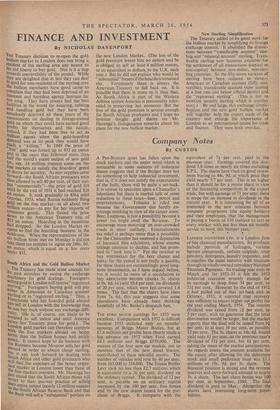By CUSTOS A PRE-BUDGET q uiet has fallen upon the stock
markets and the easier trend which is noticeable in some sections of indust,rial shares suggests that if the Budget does not do something to help industrial investment, that is, if it does not satisfy the expectations of the bulls, there will be quite a set-back. It is unwise to speculate upon a Chancellor's intentions but there is market talk of some reduction in three taxes—beer, petrol and entertainments. TobacCo is ruled out because the Government can hardly en- courage smoking in view of the cancer scare. Beer, I suppose, is just a possibility because a lower tax might swell the Revenue. To encourage more motoring' on over-crowded roads is most unlikely. Entertainments tax relief is perhaps more than a possibility for the Chancellor has received a deputation of harassed film exhibitors, whose cinema takings continue to decline, and has prom- ised to "look into it." For the investor to buy WHITBREAD for the beer chance and SHELL for the petrol is not really a gamble, for these shares are outstandingly good long- term investments, as I have argued before, but it would be more of a speculation to buy ASSOCIATED BRITISH CINEMA 5s. shares at 9s. 6d. to yield 10.4 per cent. on dividends of 20 per cent, which were last covered 1.4 times. The fact that the shares have risen from 7s. 6d. this year suggests that some speculators have already been thinking hopefully of Mr. Butler's despatch box.
THE FORD MOTOR earnings for 1953 were excellent. Comparison with 1952 is difficult because1953 included only six months' earnings of Briggs Motor Bodies, but at £7.6 millions net profits have clearly made a big advance on 1952 when Ford earned £4.1 millions and Briggs £939,000. The success of the four new car models, not to mention that of , the new diesel tractor, contributed to these splendid results. The number of vehicles sold rose by 40 per cent. from 165,000 to 234,000. The Excess Profits Levy took no less than £2.7 millions which is equivalent to a 26, per cent. dividend on the ordinary capital. 'The dividend of 12 per cent. is payable on an ordinary capital increased by the 100 per cent. free bonus and by the new shares issued for the pur- chase of Briggs. It compares with the equivalent of 7) per cent. paid in the previous year. Earnings covered this divi- dend 3.8 times or nearly six times excluding E.P.L. The shares have risen on good invest- ment buying to 44s. 9d. at which price they yield nearly 5.7 per cent. This is no higher than it should be for a motor share in view of the increasing competition in the export trade, but with earnings of 71 per cent. there is scope for an increase in dividends in the current year. It is interesting for all of us interested in the new relations between company proprietors (the equity holders) and their employees, that the management is paying a bonus of £10 (subject to tax) to every, worker with not less than six months service to mark this bumper year.
't










































 Previous page
Previous page